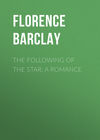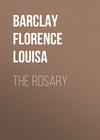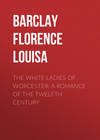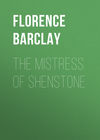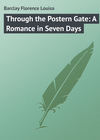Читать книгу: «The Following of the Star: A Romance», страница 10
CHAPTER XIX
DAVID STUDIES THE SCENERY
The railway journey passed with surprising ease and swiftness. David's unusually high spirits were perhaps responsible for this.
To Diana it seemed that their positions were suddenly and unaccountably reversed. David led, and she followed. David set the tone of the conversation; and, as he chose that it should be gay and bantering, Diana found it impossible to strike the personal and pathetic note, bordering on the intimate and romantic, which she, somehow, now felt suitable to the occasion.
So they had a merry wedding-breakfast in the dining-car; and laughed much over the fact that they had left Mrs. Marmaduke Vane, with two strings to her bow – Diana's godfather, and Diana's lawyer.
"Both are old flames of Chappie's," explained Diana. "She will be between two fires. But I am inclined to think Sarah's presence will quench god-papa's ardour. In which case, Mr. Inglestry will carry Chappie off to luncheon, and will probably dance attendance upon her during the remainder of the day. After which, even if he does not actually propose, I shall have to hear the oft-told tale: 'He made his meaning very clear, my dear Diana.' How clever all these old boys must be, to be perpetually 'making their meaning clear' to Chappie, which, I admit, must be a fascinating occupation, and yet remaining triumphantly unwed! Chappie does not return home until to-morrow. David – I shall be quite alone at Riverscourt to-night."
"Oh, look at the undulating line of those distant hills!" cried David, polishing the window with his table-napkin. "And the gorse in bloom, on this glorious common. It seems a waste to look for a moment on one's plate, while passing, for the last time, through beautiful England. Even in winter this scenery is lovely, gentle, home-like. I don't want to miss the sight of one cosy farmhouse, leafless orchard, nestling village, or old church tower. All upon which I am now looking, will be memory's treasured picture-gallery to visit eagerly in the long months to come."
Apparently there were to be only landscapes in David's picture gallery. Portraits, however lovely, were not admitted. A very lovely face was opposite to him at the little table. A firm white chin rested thoughtfully in the rounded palm of the hand on which gleamed his golden wedding-ring. Soft grey eyes, half-veiled by drooping lids and long dark lashes, looked wistfully, earnestly, at the thin lines of his strong eager face. Diana was striving to imprint upon her memory a portrait of David, which should not fade. But David polished the window at intervals with his table-napkin, and assiduously studied Hampshire orchards, and frost-covered fields and gardens.
Back in their own compartment, within an hour of Southampton, Diana made a desperate attempt to arrive at a clear understanding about the rapidly approaching future – those two years, possibly three, while they would be husband and wife, yet on different sides of the globe.
She was sitting beside David, who occupied the corner seat, facing the engine, on her left. Diana had been seated in the corner opposite to him; but had crossed over, in order to sit beside him; and now asked him, on pretext of being dazzled, to draw down the blinds on his side of the compartment.
David complied at once, shutting out the pale wintry sunlight; which, pale though it was, yet made a golden glory of Diana's hair.
Thus excluded from his refuge in the leafless orchards, David launched into a graphic description of the difficulties and adventure of African travel.
"You see," he was saying, "the jungle grasses grow to such a height that it becomes almost impossible to force one's way through them; and they make equally good cover for wild beasts, or mosquitoes" – when Diana laid her hand upon his coat sleeve.
Either the sleeve was thick, or David was dense – or both. The account of African swamps continued, with increased animation.
"As soon as the wet season is over, the natives fire the grass all around their villages; and then wild beasts get no cover for close approach; shooting becomes possible, and the women can get down to the river to fetch water, or into the forests to cut firewood. The burning kills millions of mosquitoes, makes it possible to go out in safety, and to shoot game. When the grass is high, mosquitoes are rampant, and game impossible to view. Before the burning was done round my place, last year, I found a hippopotamus in my flower garden, when I came down to breakfast one morning. He had danced a cake-walk among my oleanders, which was a trial, because oleanders bloom gloriously all the year round when once they get a hold."
Suddenly Diana turned upon him, took his right hand between both hers, and caught it to her, impulsively.
"David," she said, "do you consider it right in our last hour together, completely to ignore the person you have just married?"
David's startled face showed very white against the green window-blind.
"I – I was not ignoring you," he stammered, "I was telling you about – "
"Oh, I know!" cried Diana, uncontrollable pain in her voice, and the look of a wounded leopard in her eyes, "Bother your tall grasses, and your oleanders, and your hippopotamus!" Then more gently, but still holding his hand pressed against her velvet coat: "Oh, don't let's quarrel, David! I don't want to be horrid! But we can't ignore the fact that we were married this morning; and you are wasting the only time left to us, in which to discuss our future."
David gently drew away his hand, folded his arms across his breast, leaned back in his corner, and looked at Diana, with that expression of patient tenderness which always had the effect of making her feel absurdly young, and far removed from him.
"Have we not said all there is to say about it?" he asked, gently.
"No, silly, we have not!" cried Diana, furiously. "Oh, how glad I am that you are going to Central Africa!"
David's face whitened to a terrible pallor.
"There is nothing new in that," he said, speaking very low. "It has been understood all along."
"Oh, David, forgive me," cried Diana. "I did not mean to say anything unkind. But I am so miserable and unhappy; and if you say another word about Hampshire scenery or African travel, I shall either swear and break the windows, or fall upon your shoulder and weep. Either course would involve you in an unpleasant predicament. So, for your own sake, help me, David."
David's earnest eyes searched her face.
"How can I help you?" he asked, his deep voice vibrating with an intensity which assured Diana of having gained at last his full attention. "What has made you miserable?"
"Our wedding-service," replied Diana, with tears in her voice. "It meant so much more than I had ever dreamed it possibly could mean."
Then a look leapt into David's eyes such as Diana had never seen in mortal eyes, before.
"How?" he said; the one word holding so much of question, of amazement, of hope, of suspense, that its utterance seemed to arrest the train; to stop the beating of both their hearts; to stay the universe a breathing space; while he looked, with a world of agonised hope and yearning, into those sweet grey eyes, brimming over with tears.
Perhaps the tears blinded them to the meaning of the look in David's. Anyway, his sudden "How?" bursting as a bomb-shell into the silent railway-carriage, only brought an expression of startled surprise, to add to the trouble in Diana's sweet face.
David pulled himself together.
"How?" he asked again, more gently; while the train, the hearts, and the universe went on once more.
"Oh, I don't know," said Diana, with a little break in her voice. "I think I realised suddenly, how much it might mean between two people who really cared for one another – I mean really loved– for we do 'care'; don't we, Cousin David?"
"Yes, we do care," said David, gently.
"I want you to talk to me about it; because the service was so much more solemn than I had expected; I have never been at any but flippant weddings – what?.. Oh, yes, weddings are often 'flippant,' Cousin David. But ours was not. And I am so afraid, after you are gone, it will come back and haunt me. I want you to tell me, quite plainly, how little it really meant; although it seemed to mean so appallingly much."
David laid his hand gently on hers, as it lay upon her muff, and the restless working of her fingers ceased.
"It meant no more," he said, quietly, "than we intended it should mean. It meant nothing which could cause you distress or trouble. All was quite clear between us, beforehand; was it not? That service meant for you – your home, your fortune, your position in the county, your influence for good; deliverance from undesired suitors; and – I hope – a friend you can trust – though far away – until death takes him – farther."
He kept his hand lightly on hers, and Diana's mind grew restful. She laid her other hand over his. She was so afraid he would take it away.
"Oh, go on David," she said. "I feel better."
"You must not let it haunt you when I am gone," continued David. "You urged me to do this thing, for a given reason; and, when once I felt convinced we were not wrong in doing it, I went through with it, as I had promised you I would. There was nothing in that to frighten or to distress you. We could not help it that the service was so wonderful. That was partly your fault," added David, with a gentle smile, "for providing organ music, and for choosing to impersonate my Lady of Mystery."
Diana considered this. Then: "Oh, I am so comforted, Cousin David," she said. "I was so horribly afraid it had – somehow – meant more than I wanted it to mean."
"How could it have meant more than you wanted it to mean?"
"I don't know. I begin to think Uncle Falcon was right, when he called me ignorant and inexperienced."
David laughed. "Oh, you mustn't begin to give in to Uncle Falcon," he said. "And to-day, of all days, when our campaign has succeeded, and we have defeated him. You can go into the library this evening, look Uncle Falcon full in the eyes, and say: 'Uncle Falcon, I have won!'"
"Can I?" said Diana, doubtfully. "I am a little bit afraid of Uncle Falcon. I could, if you were there, Cousin David."
David tried to withdraw his hand; but the hand lying lightly upon it immediately tightened.
"Are you sure I shan't be haunted after you are gone?" asked Diana, with eyes that searched his face.
"Not by me," smiled David.
"Of course not. But by the service?"
"Are any special words troubling you?" he asked, gently.
"Goodness, no!" cried Diana. "I realised nothing clearly excepting 'I will,' when you said it. I haven't a ghost of a notion what I promised."
"Then if you haven't a ghost – " began David.
"Oh, don't joke about it," implored Diana. "I am really in earnest. I was horribly afraid; and I did not know of what. I began to think I should be obliged to ask you to put off, and to go by a later boat."
"Why?"
"So as to have you here, to tell me it had not meant more than we intended it should mean."
Diana took off her large hat, and threw it on to the seat opposite. Then she rested her head against the cushion, close to David's.
"Oh, this is so restful," she sighed; "and I am so comforted and happy! Do let's stop arguing."
"We are not arguing," said David.
"Oh, then let's stop not arguing!"
She lifted his hand and her muff together, holding them closer to her.
"Let's sit quite still, David, and realise that the whole thing is safely over, and we are none the worse for it; and have got all we wanted in the world."
David said nothing. He had stopped "not arguing."
The train sped onward.
A sense of complete calm and rest came over the two who sat silent in their compartment, moving so rapidly toward the moment of inevitable parting. Diana's head was so near to David's that a loose strand of her soft hair blew against his face. She let her muff drop, but still held his hand to her breast. She closed her eyes, sitting so still that David thought she had fallen asleep.
At length, without stirring, she said: "We shall write to each other, Cousin David?"
"If you wish."
"Of course I wish. Will you promise to tell me exactly how you are?"
"I never speak, think, or write, about my own health."
"Tiresome boy! Do you call this 'obeying' me?"
"I did not promise to obey you."
"Oh, no; I forgot. How wickedly one-sided the marriage service is! That is one reason why I always declared I never would marry. One law for the man, and another for the woman; and in a civilized country! We might as well be Hottentots! And what a slur on a woman to have to change her name – often for the worse. I knew a Miss Pound who married a Mr. Penny."
David did not laugh. He had caught sight of the distant ships on Southampton water.
"Everybody made endless puns on the wedding-day," continued Diana. "I should have been in such a rage before the reception was over, had I been the bride, that no one would have dared come near me. It got on her nerves, poor girl; and when some one asked her just as they were starting whether she was going to take care of the Penny and leave the Pounds to take care of themselves, she burst into tears, and drove away, amid showers of rice, weeping! I think Mr. Penny must have felt rather 'cheap'; don't you? Well, anyway, I have kept my own name."
"You have taken mine," said David, with his eyes on the masts and funnels.
"How funny it will seem to get letters addressed: Mrs. David Rivers. If my friends put D only, it might stand for 'Diana.' David – " she turned her head suddenly, without lifting it, and her soft eyes looked full into his dark ones – "David, what shall you call me, when you write? I am no longer Miss Rivers, and you can hardly begin your letters: My dear Mrs. Rivers! That would be too formal, even for you! At last you will have to call me 'Diana.'"
David smiled. "Not necessarily," he said. "In fact, I know how I shall begin my letters; and I shall not call you 'Diana.'"
"What then?" she asked; and her lips were very close to his.
David sat up, and touched the springs of the window-blind.
"I will tell you, as we say good-bye; not before. Look! We are running through Southampton. We shall be at the quay in two minutes."
CHAPTER XX
WITH THE COMPLIMENTS OF THE COMPANY
Diana followed David up the gangway of the big liner, and looked around with intense interest at the floating hotel he was to inhabit during so many days; the vessel which was to bear him away to the land from which he never intended to return.
Diana experienced an exhilarating excitement as she and David stepped on board, amid a bustling crowd of other passengers and their friends; the former already beginning to eye one another with interest; the latter, to follow with wistful gaze those from whom they would so soon be parted.
Diana had left the train, at the dock station, with very different sensations from those with which she had entered it at Waterloo. She now felt so indescribably happy and at rest; so completely reassured as to the future. David had been so tender and understanding, so perfect in all he had said and done, when once she had succeeded in making him realise how much more their new relationship meant to her, than it did to him. He had so patiently allowed her to hold his hand, during the remainder of the journey. She could feel it still, where she had pressed it against her bosom. It seemed to her that she would always feel it there, in any time of doubt or of difficulty. It must be because of David's essential goodness, that his touch possessed such soothing power. The moment he had laid his hand on hers, she had thought of the last verse of his favourite hymn.
Her car, sent down from town the day before, to be in readiness to take her home, awaited her as near the gangway of the steamer as the regulations of the wharf would allow. It was comforting to know that there would not be the need for a train journey, after David's departure. It might have seemed lonely without him. Once safely tucked into her motor, she was at home, no matter how long the run to Riverscourt might chance to be.
David caught sight of the car; and she had to stand, an amused spectator, while he ran quickly down to say good-bye to her footman and to her chauffeur. She saw the wooden stiffness of the footman, and the iron impassivity of the chauffeur, subside into humanity, as David shook them each by the hand, with a kindly word of remembrance and farewell. Both automata, for the moment, became men. Diana could see the glow on their faces, as they looked after David. Had he tipped them each a five-pound note, they would have touched their hats, without a change of feature. In the warmth of this farewell, they forgot to touch their hats; but David had touched their hearts, which was better; and their love went with him, as he boarded the steamer.
This little episode was so characteristic of David. Diana thought it over, with tender amusement in her eyes, as she followed him up the gangway. Wherever he went he won the hearts of those who served him. He found out their names, their joys and sorrows, their hopes and histories, with astonishing rapidity. "I cannot stand the plan of calling people by their occupation," he used to say. "Like the crude British matron in the French hotel, who addressed the first man she met in a green apron, as 'Bottines!'"
So "Boots," "Waiter," and "Ostler," became "Tom," "Dick," and "Harry," to David, wherever he went; and while other people were served by machines, for so much a day, he was hailed by men, and waited on with affection. And he, who never forgot a face, also had the knack of never forgetting the name appertaining to that face, nor the time and circumstance in which he had previously come in contact with it.
Diana soon had evidence of this as they boarded the liner, on which David had already travelled. On all sides, impassive faces suddenly brightened into smiles of welcome; and David's "Hullo, Jim!" or "Still on board, Harry?" would be met with: "Glad to see you looking better, Mr. Rivers"; or "We heard you was a-coming, sir." David, who had left love behind, found love awaiting him.
Opposite the purser's office, he hesitated, and turned to Diana.
"Where would you like to go?" he said. "We have nearly an hour."
"I want to see over the whole ship," said Diana. "But first of all, of course, your cabin." David looked pleased, and led the way down to a lower deck, and along a narrow passage, with doors on either side. At number 24 he stopped.
"Here we are," he said, cheerfully.
Diana entered a small cabin, already choked with luggage. It contained three berths. On two of them were deposited rugs, hand-bags, and men's cloth caps. A lower one was empty. Several portmanteaux blocked the middle of the small room. David followed her in, and looked around.
"Hullo!" he said. "Where is my baggage? Apparently it has not turned up. This is my bunk, right enough."
"What a squash!" exclaimed Diana.
Before David could reply, a steward put his head in at the door.
"Well, Martin," said David, "I'm back in my old quarters, you see. I am glad you are still on duty down this passage."
The man saluted, and came in with an air of importance.
"Glad to see you, sir, I'm sure; and looking a deal better than when you came home, sir. But I'm not to have the pleasure of waiting on you this time, Mr. Rivers. The purser gave orders that I was to hand you this, as soon as you arrived."
He handed David a letter, addressed to himself.
David tore it open, glanced at it; then turned to Diana, his face aglow with surprise and pleasure.
"I say!" he exclaimed. "They ask me to accept better accommodation, 'with the compliments of the company.' Well, I've heard of such a thing happening to actors, public singers, and authors; but this is the first time I have known it happen to a missionary! Where is number 74, Martin?"
"On the promenade deck, sir; nicely midship. Allow me to show you."
Martin led the way. David, full of excitement, pleasure, and surprise, followed, with Diana.
Diana took it very quietly – this astonishing attention of the company's. But her eyes shone like stars. Diana loved seeing people have surprises.
Number 74 proved to be a large airy state-room for three; but only one lower berth was made up. David was in sole possession. It contained an easy chair, a wardrobe, a writing table, a movable electric lamp, and was so spacious, that David's baggage, standing in one corner, looked quite lost, and took up practically no room.
"A private bathroom is attached, sir," explained Martin, indicating a side door; "and a mate of mine is looking forward to waiting on you, sir. I'm right sorry not to have you in 24, but glad to see you in more roomy quarters, Mr. Rivers."
"Oh, I say!" exclaimed David, boyishly, as Martin retired, closing the door. "They've actually given me an eighty guinea state-room, all to myself! Heaven send there's no mistake! 'With the compliments of the company!' Think what that means!"
"Will it add very much to your comfort, David?" asked Diana, innocently.
"Comfort?" cried David. "Why it's a palace! And just think of being to oneself – and an armchair! Four electric lights in the ceiling" – David turned them all on – "and this jolly little reading lamp to move about. I shall be able to read in my bunk. And two big windows. Oh, I say! I shall feel I ought to invite two other fellows in. It is too sumptuous for a missionary!"
"No, you mustn't do that, David," said Diana. "It would be too disappointing to – to the company. Look upon it as an offering of gold and frankincense, and do not rob the giver of the privilege of having offered the gift. Promise me, David."
"Of course I promise," he said. "I am too absolutely thankfully grateful, to demur for a moment, about accepting it. Only, it is a bit overwhelming."
"Now trot me all over the ship," commanded Diana. "And then let us return here, to say good-bye."
Покупайте книги и получайте бонусы в Литрес, Читай-городе и Буквоеде.
Участвовать в бонусной программе
